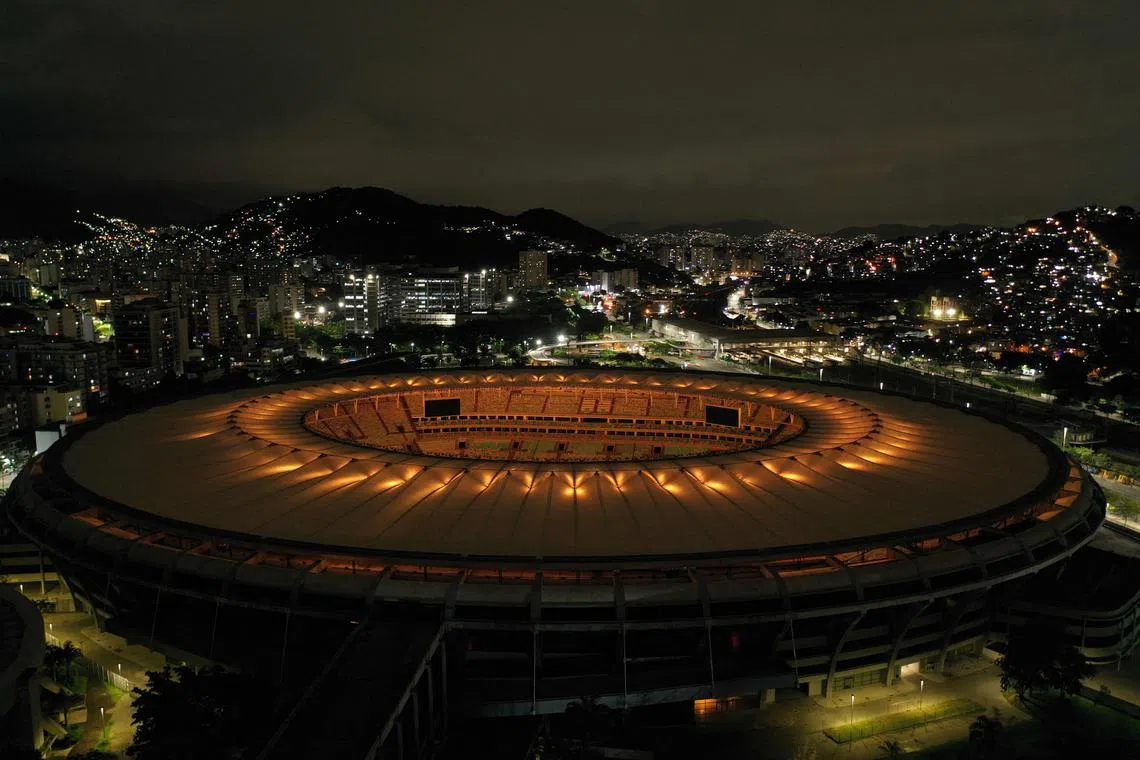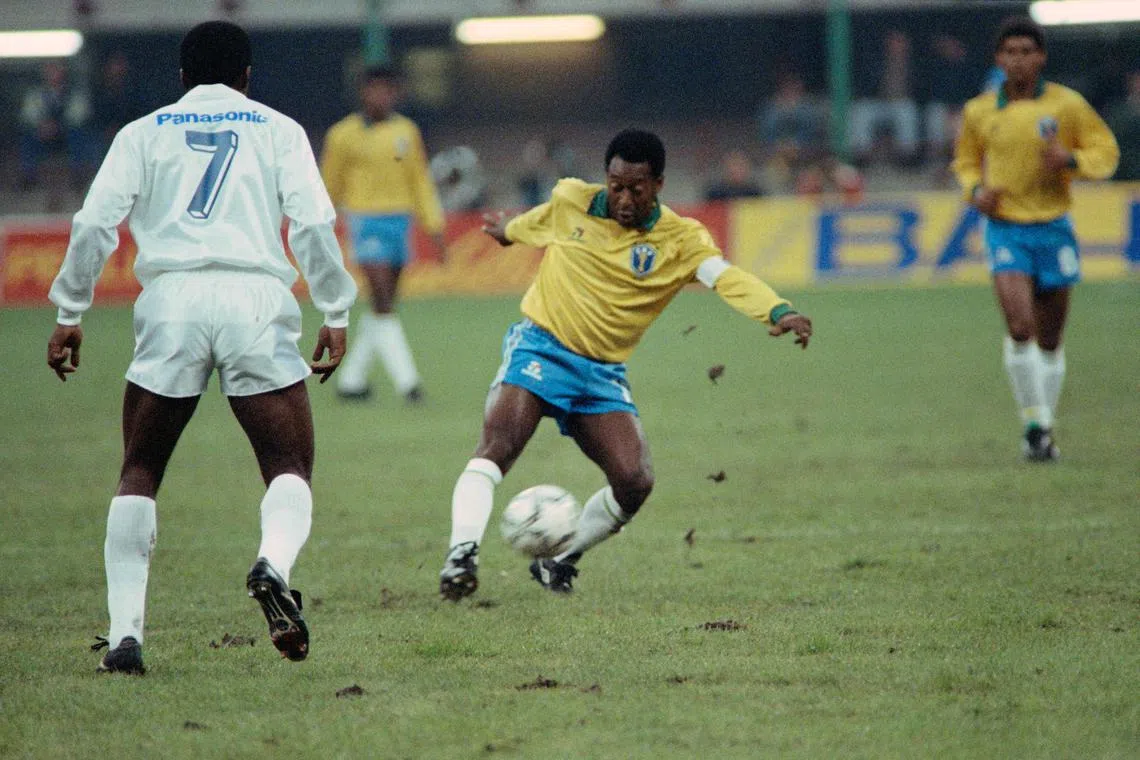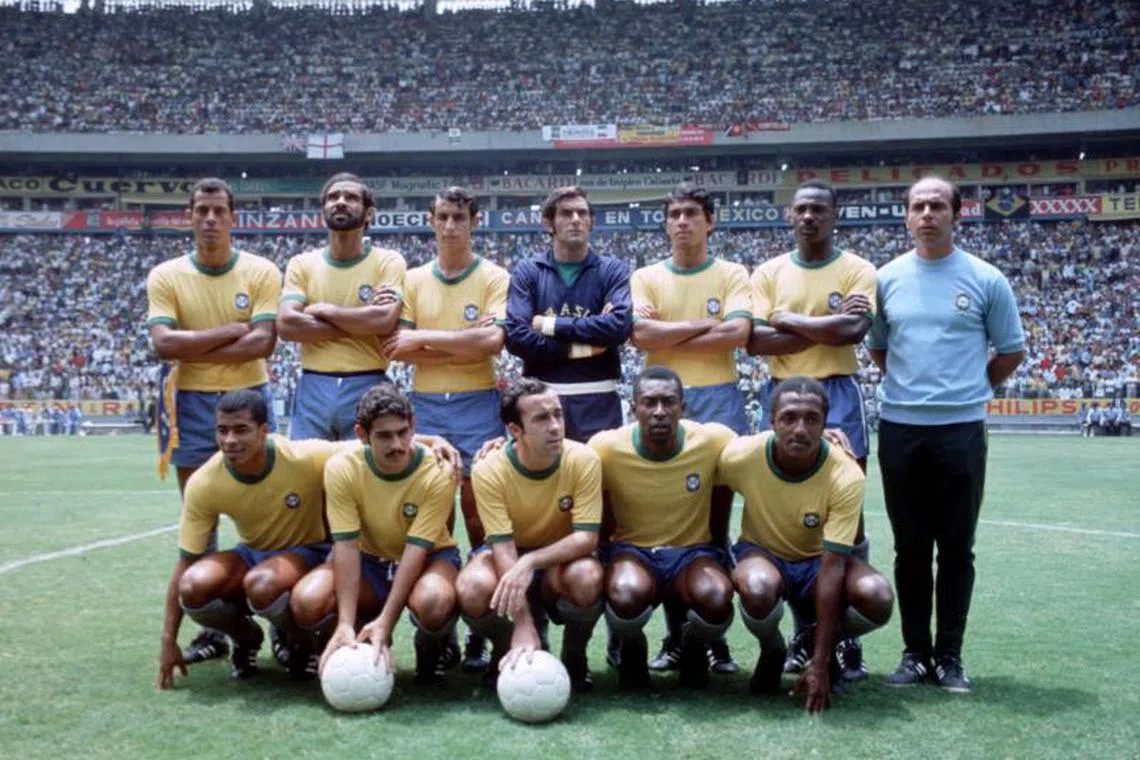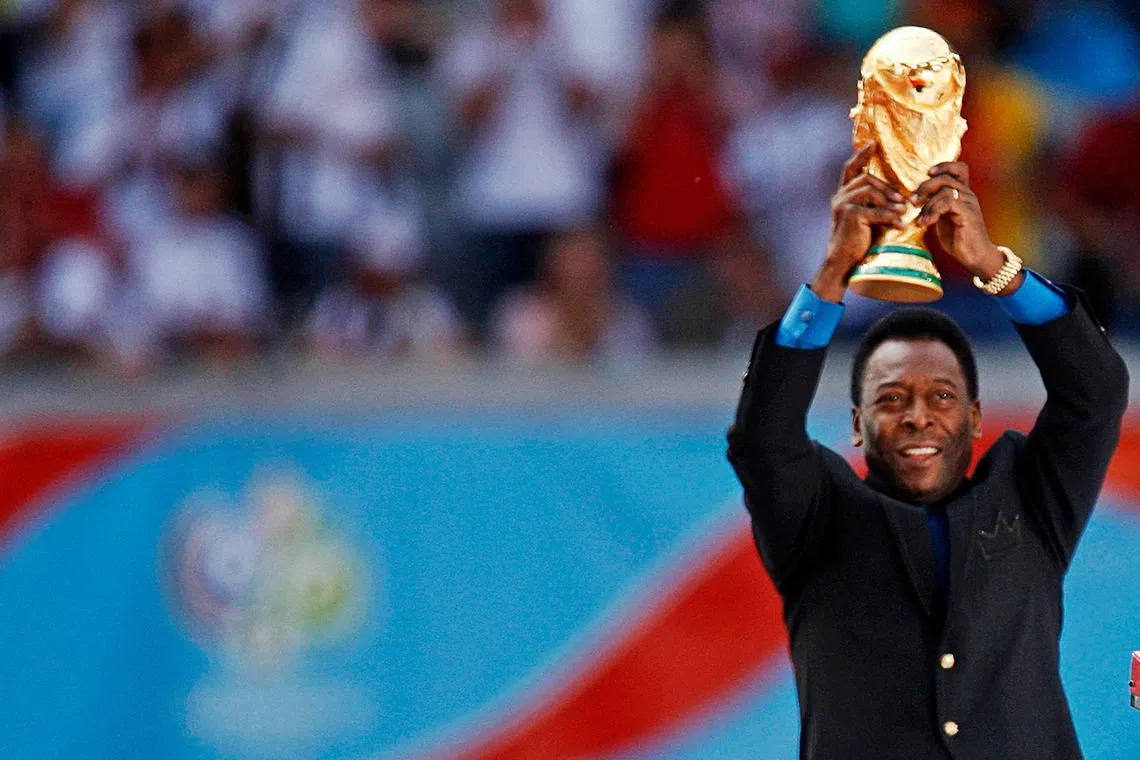Brazilian football legend Pele dies at 82 after battle with cancer
Sign up now: Get the biggest sports news in your inbox
SAO PAULO - At the end of Pele’s life, what will remain will be “inspiration and love” and a lot of fond memories as the football and sporting world mourned his death.
The legendary Brazilian footballer, who rose from barefoot poverty to become one of the greatest and best-known athletes in modern history, died in Sao Paulo on Thursday at the age of 82.
The Albert Einstein hospital, where Pele was undergoing treatment, said he died at 3.27pm “due to multiple organ failure resulting from the progression of colon cancer associated with his previous medical condition”.
The death of the only man to win the World Cup three times as a player was confirmed on his Instagram account.
“Inspiration and love marked the journey of King Pele, who peacefully passed away today,” it read, adding that he had “enchanted the world with his genius in sport, stopped a war, carried out social works all over the world and spread what he most believed to be the cure for all our problems: love”.
Tributes poured in from across the worlds of sport, politics and popular culture for a figure who epitomised Brazil’s dominance of the Beautiful Game.
The government of President Jair Bolsonaro, who is about to leave office, declared three days of mourning, and said in a statement that Pele was “a great citizen and patriot, raising the name of Brazil wherever he went”.
Bolsonaro’s successor, President-elect Luiz Inacio Lula da Silva, wrote on Twitter that “few Brazilians carried the name of our country as far as he did”.
French President Emmanuel Macron said Pele’s legacy would live forever. “The game. The king. Eternity,” Macron tweeted.

Maracana stadium is illuminated with a golden light in honour of Brazilian football legend Pele, in Rio de Janeiro, Brazil on Dec 29, 2022.
PHOTO: AFP
Pele had been undergoing chemotherapy since he had a tumour removed from his colon in September 2021.
He also had difficulty walking unaided since an unsuccessful hip operation in 2012. In February 2020, on the eve of the coronavirus pandemic, his son Edinho said Pele’s ailing physical state had left him depressed.
On Monday, a 24-hour wake will be held for Pele in the centre of the field at the stadium of Santos, his hometown club where he started playing as a teenager and quickly rose to fame.
The next day, a parade carrying his coffin will pass through the streets of Santos, passing the neighbourhood where his 100-year-old mother lives, and ending at the Ecumenical Memorial Necropolis cemetery, where he will be buried in a private ceremony.
Pele, whose given name was Edson Arantes do Nascimento, joined Santos in 1956 and turned the small coastal club into one of the most famous names in football.
In addition to a host of regional and national titles, Pele won two Copa Libertadores titles, the South American equivalent of the Champions League, and two Intercontinental Cups, the annual tournament held between the best teams in Europe and South America.
He took home three World Cup winner’s medals, the first time as a 17-year-old in Sweden in 1958, the second in Chile four years later – even though he missed most of the tournament through injury – and the third in Mexico in 1970, when he led what is considered to be one of the greatest sides ever to play the game.
He retired from Santos in 1974 but a year later made a surprise comeback by signing a lucrative deal to join the New York Cosmos in the then nascent North American Soccer League.

In a glorious 21-year career, Pele scored from 1,281 to 1,283 goals, depending on how matches are counted.
PHOTO: AFP

The 1970 Brazilian World Cup team who won the Jules Rimet trophy. They became the first country to win the World Cup three times.
PHOTO: ACTION IMAGES / SPORTING PICTURE
In a glorious 21-year career, he scored between 1,281 and 1,283 goals, depending on how matches are counted.
Pele, though, transcended football, like no player before or since, and he became one of the first global icons of the 20th century.
With his winning smile and an aw-shucks humility that charmed legions of fans, he was better known than many Hollywood stars, popes or presidents – many if not most of whom he met during a six-decade-long career as player and corporate pitchman.
“I am sad, but I am also proud to be Brazilian, to be from Pele’s country, a guy who was a great athlete,” said Ciro Campos, a 49-year-old biologist in Rio de Janeiro. “And also off the field, he was a cool person, not an arrogant athlete.”
Pele credited his one-of-a-kind mix of talent, creative genius and technical skill to a youth spent playing pick-up games in small-town Brazil, often using grapefruit or wadded-up rags because his family could not afford a real ball.
He was named “Athlete of the Century” by the International Olympic Committee, co-“Football Player of the Century” by world football body Fifa, and a “national treasure” by Brazil’s government.
His celebrity was often overwhelming. Grown adults broke down crying in his presence with regularity. As a player, souvenir-seeking fans often rushed to the field following games and tore off his shorts, socks and even underwear.
His house in Brazil was less than a mile from a beach, but he did not go there for some two decades because of fear of crowds.
Yet even in unguarded moments among friends, he rarely complained. He believed that his talent was a divine gift, and he spoke movingly about how football allowed him to travel the world, bring cheer to cancer patients and survivors of wars and famine, and provide for a family that, growing up, often did not know the source of their next meal.
“God gave me this ability for one reason: To make people happy,” he said during a 2013 interview with Reuters. “No matter what I did, I tried not to forget that.”
Brazil’s CBF football federation said: “Pele was much more than the greatest sportsman of all time... The King of Soccer was the ultimate exponent of a victorious Brazil.”
Kylian Mbappe, the French star who is tipped to assume the mantle as the world’s best footballer, also offered his condolences.
“The king of football has left us but his legacy will never be forgotten,” he wrote on Twitter. “RIP KING.” REUTERS

Pele holds the World Cup trophy during the World Cup opening ceremony in Munich, Germany, on June 9, 2006. He was a member of the 1958, 1962 and 1970 World Cup-winning Brazilian soccer teams.
PHOTO: REUTERS


